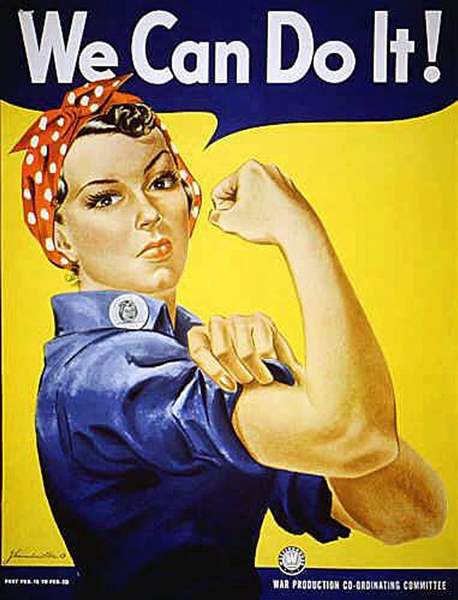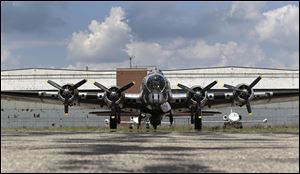
Group attempts to save the real Rosie’s factory for air museum
7/29/2013
“Rosie the Riveter” was based on Rose Will Monroe who worked at the Willow Run Bomber Plant near Detroit.
ASSOCIATED PRESS

“Rosie the Riveter” was based on Rose Will Monroe who worked at the Willow Run Bomber Plant near Detroit.
YPSILANTI, Mich. — The Detroit-area factory where Rosie the Riveter showed that a woman could do a “man’s work” by building World War II-era bombers, making her an enduring symbol of American female empowerment, will be demolished if money can’t be found to save it.

The B-17G "Yankee Lady" is parked in front of the old Willow Run Bomber Plant at Willow Run Airport in Ypsilanti Township, Mich. Donors are hoping to save the plant and convert it into the new home of the Yankee Air Museum.
The Willow Run Bomber Plant, a 332-acre former Ford Motor Co. factory west of Detroit that churned out nearly 9,000 B-24 Liberator bombers during World War II, is slated to be torn down unless a group can raise $3.5 million by Thursday to convert at least some of the structure into an expanded home for the nearby Yankee Air Museum.
“The younger generation needs to know what people went through and be able to go and see what they did and how they did it for our country,” Larry Doe, a 70-year-old Ypsilanti Township resident who has given to the cause, said recently before joining other donors for a trip on a B-17.
Although women performed what had been male-dominated roles in plants all over the country during the war, it was a Willow Run worker — one of an untold number of women in its 40,000-person work force — who caught the eye of Hollywood producers casting a “riveter” for a government film about the war effort at home.
Rose Will Monroe, a Kentucky native who moved to Michigan during the war, starred as herself in the film and became one of the best-known figures of that era. She represented the thousands of Rosies who took factory jobs making munitions, weaponry, and other things while many of the nation’s men were off fighting in Europe and the Pacific.
Although many Rosies were let go once the war was over and the soldiers returned home, they had shown that women were capable of doing jobs that traditionally had been done by only men. An illustrated poster of a determined-looking Rosie the Riveter rolling up her sleeve with the slogan, “We can do it!,” became an iconic symbol of female empowerment for American women.
The Willow Run factory went back to making automobiles after the war ended, and it did so for more than a half-century under the General Motors name before closing for good in 2010.
Now, Mr. Doe and other donors are hoping to save at least some of the massive structure to convert it into the new home of the Yankee Air Museum. The museum’s original headquarters burned down in 2004, and it is now housed at Willow Run Airport in nearby Van Buren Township.
Organizers of the “Save the Willow Run Bomber Plant” campaign say they need $8 million to fund their “separation” plan. They want to acquire part of the 5 million-square-foot plant, secure it, and re-establish utility services such as water, gas, and electric.
They have raised $4.5 million of what they need and hope to entice major donors to come forward with six and seven-figure commitments.